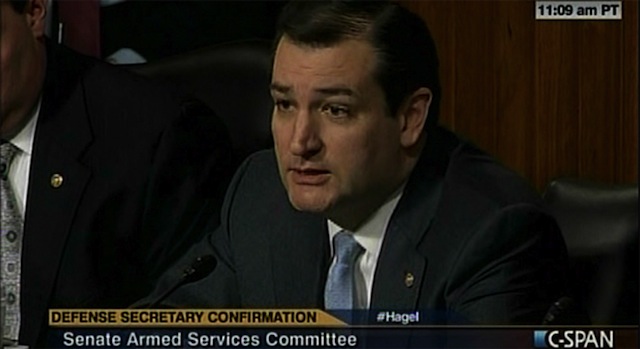by Jim Lobe
As I noted in the piece published on IPS Friday, “It’s All About Israel,” Israel and the presumed threat posed by Iran to its security dominated Chuck Hagel’s confirmation hearing before the Senate Armed Services Committee (SASC) Thursday. It was the one opportunity Committee members — and, for that matter, the entire Senate — had to publicly probe the nominee’s basic beliefs about the myriad challenges confronting U.S. national security in what Robert Gates described, while he was still working for George W. Bush, as an increasingly “multi-polar world.” That the panel chose to focus almost exclusively on the challenges facing Israel, rather than the United States, speaks volumes about the influence of the Israel lobby on the U.S. Senate. It also speaks volumes about the very basic lack of seriousness or curiosity on the SASC’s part about the geo-strategic issues that one would expect to be at or near the top of the Pentagon’s agenda. As Chas Freeman put it to me, the whole scene made it look like senators were “busking for campaign dollars” rather than grappling with the multi-faceted problems the U.S. armed forces face around the world.
So I wanted to give some additional idea of just how negligent I think the Committee’s questioning was by compiling a list with some brief annotations or explanations of countries, non-state actors, and regions and the number of times each was mentioned in the hearing. (If someone has the software to create a map of the world based on the number of mentions a country gets based on this list, I’d love to publish it on Lobelog.)
I should mention at the outset, however, that one of the most surprising discoveries to me was this: Al Qaida — you know, the group and its affiliates that have supposedly been Public Enemy #1 since 9/11 and that Republicans have been arguing for several months now has still not been defeated and is now popping up all over the place, planning attacks on the American homeland — was mentioned a grand total of twice during the eight hours of testimony. That compares with 24 mentions of Hezbollah and 11 of Hamas, neither of which has been accused by the U.S. government of planning attacks on the U.S. homeland, let alone actually carrying any out. The disproportionate focus on these two non-state actors — contrasted with the virtually complete lack of curiosity about Al Qaida and its affiliates — is yet another manifestation of the degree to which the SASC appears to be far more concerned about Israel’s security than that of the United States. (I should note that SASC senators have submitted written questions to Hagel which no doubt cover a much broader number of issues than were raised at the hearing. But the hearing is the only opportunity to raise these issues in ways that get broader attention, and that’s what makes it so important.)
I have left out two countries that were mentioned numerous times: Vietnam (41 references) and Germany (9 references) because all mentions of those two countries were biographical; that is, they didn’t relate to current policy, but rather only to Hagel’s experience and relationship to them.
In any event, here is the partially annotated list. The number on the left refers to the number of mentions in the transcript:
178 – Israel
171 – Iran (threat to Israel)
30 – Iraq (where we just concluded a war in which nearly 4,500 U.S. servicemen and women were killed)
27 – Afghanistan (where we still have well over 60,000 U.S. troops deployed and the exit strategy remains unclear.)
24 – Hezbollah (threat to Israel)
23 – Russia (only other major nuclear power which also will have a major influence on U.S. policy toward Iran, Syria, and withdrawal from Afghanistan, among other issues.)
22 – Palestine or Palestinians (threat to Israel)
18 – Syria (a country torn by civil war and a possible threat to Israel.)
11 – North Korea (a nuclear power believed to be preparing another nuclear test.)
11 – Hamas (threat to Israel)
10 – Pakistan (a nuclear power whose cooperation is critical to U.S. Afghanistan policy.)
9 – Egypt (a country undergoing heavy turbulence to which the U.S. provides $1.5 billion a year in military aid; potential threat to Israel.)
6 – Asia (yes, the entire continent, consisting of over half the world’s population toward which our military is supposed to be “pivoting.”)
5 – China (critical to U.S. policy toward Iran and many other hotspots, not to mention its being the geo-strategic focus of the above-mentioned “pivot.”)
5 – NATO (Washington’s most important alliance and the one with which it conducted an aerial campaign in Libya, is still fighting in Afghanistan, and just set up Patriot missile batteries in Turkey close to the Syrian border.)
5 – European Union (all references were related to the EU’s refusal to put Hezbollah on its terrorism list.)
2 – Libya (the country where Republicans have complained that Obama’s “leading from behind” has led to disaster.)
2 – Yemen (the country where the Pentagon is working with the CIA to carry out drones strikes against suspected Al-Qaida militants)
2 – Bahrain (another country in turmoil which is also home to the U.S. Navy’s Fifth Fleet)
2 – Somalia (another country in turmoil where the U.S. military has attacked suspected Al Qaida and Al Shabaab leaders)
2 – Al Qaida (in all its forms)
1 – Mali (where the U.S. just provided logistical and intelligence support for a French campaign against Al Qaida in the Maghreb)
1 – Jordan
1 – Turkey (NATO ally neighboring Syria, Iraq, Iran, and Lebanon)
1 – Japan (closest U.S. ally in Asia with which Washington has a mutual defense treaty. U.S. has 50,000 troops based there.)
1 – South Korea (second closest U.S. ally in Asia. U.S. has 28,000 troops based there.)
1 – France (U.S. NATO ally, permanent UN Security Council member, just carried out U.S. military-backed campaign in Mali. Actually the only reference was about President Clinton granting a waiver to a French oil company operating in Iran.)
So that’s the list. Now, consider those countries which did not get a single mention during the eight hours of the hearing despite their possible strategic importance to the United States. This is necessarily a partial list, but just contemplate what the SASC was not interested in:
India (a nuclear power, world’s second most-populous nation, neighbour to Pakistan and China, avidly courted by the U.S. military in the last decade.)
Indonesia (world’s fourth most-populous nation, world’s most-populous predominantly Muslim country, avidly courted by the Pentagon over the last decade.)
Brazil (world’s fifth most-populous nation, dominant power in South America.)
Mexico (with Canada, closest U.S. neighbor which is receiving U.S. military training as part of its drug war.)
Saudi Arabia (biggest U.S. arms customer by far; closest U.S. ally in Arab world with world’s biggest oil reserves.)
Qatar (home to giant U.S. air force base; aggressively supported rebels in Libya, Syria)
Nigeria (Africa’s most populous country; major oil producer; threatened by Boko Haram insurgency allegedly tied to Al Qaida in the Maghreb; Pentagon actively seeking ties with military,)
United Kingdom (Washington’s closest NATO ally and permanent member of UN Security Council).
In this context, it’s appropriate to remember what Hagel told David Aaron Miller in that fateful 2008 interview, to wit:
And this guy kept pushing and pushing. And he alluded to the fact that maybe I wasn’t supporting Israel enough or something. And I just said let me clear something up here, in case there is any doubt.
I said, ‘I’m a United States senator. I’m not an Israeli senator. I’m a United States senator.’ I support Israel, but my first interest is I take an oath of office to the Constitution of the United States — not to a president, not to a party, not to Israel. If I go run for Senate in Israel, I’ll do that. Now I know most senators don’t talk like I do.”
You bet they don’t, Chuck.
Photo: Sen. Ted Cruz (R-TX) questioning defense secretary nominee Chuck Hagel over an appearance the former senator made on Al Jazeera in 2009.






During the Hagel Confirmation hearing, in the midst of all the denials that there is an Israel Lobby and does it intimidate US Senators, Hagel was asked to name one individual who was intiminated by this so called Lobby.
Hagel should have named himself. The hearings were quite an expose of the Israel Lobby in action.
The US yearly gives israel several billion dollars of direct foreign aid, no strings attached, plus a comparable amount of military aid. It is my contention that at least half of these US taxpayer funds come back laundered to control US elections, enabling Netanyaho to assert that he has America “in my back pocket.’ From my years in foreign aid programs I can attest that every dollar of US aid is critically analyzed and fought over in bureaucratically bloody fights — except for aid to Israel. Trying to get an honest accounting here is to invite charges of “anti-Semitism” – and political suicide..
What our poor country needs is one elected representative, from either house, wiiling to sacriice his career — someone with the courage to demand what every other US foreign assistance program gets — an honest accounting to the American people. We need that to begin to save the Republic, which we’ve lost control over.